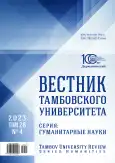The German propaganda system in the occupied Soviet territory: structure, forms, methods, content and effectiveness of activities (on the example of the General District Belarus)
- Authors: Pushkarenko E.A.1
-
Affiliations:
- Russian Customs Academy
- Issue: Vol 28, No 4 (2023)
- Pages: 987-999
- Section: NATIONAL HISTORY
- URL: https://journal-vniispk.ru/1810-0201/article/view/298026
- DOI: https://doi.org/10.20310/1810-0201-2023-28-4-987-999
- ID: 298026
Cite item
Full Text
Abstract
Importance. The interest in the research is due to the political events and processes taking place in the post-Soviet area. Russia is responding to military-technological and moral-ideological challenges. At the same time, the western information war launched against Russia axiologically, semantically has many analogies with the content of German propaganda in the occupied Soviet territory during the Great Patriotic War. The purpose of the research is to determine the order of organization, forms, methods and content, principles and effectiveness of the activities of propaganda bodies.Materials and methods. The materials of the General District Belarus, the chronological framework of the research – 1941–1944 are considered. Historical documents of the funds of the National Archive of the Republic of Belarus (NARB) were used. The latter are normative acts of the German civil administration of the General District Belarus, as well as materials of Nazi propaganda.The results of the research are of practical importance: they can be used in the educational and educational process in institutions of higher professional education.Conclusion. The propaganda activity of the German authorities on the Belarusian territory had a number of distinctive features. The ideological impact on the local population had the character of a well-organized work, which was built by analogy with the propaganda system of Nazi Germany. The propaganda was carried out taking into account the psychological and cultural-historical characteristics of the local population. In general, propaganda was assigned the role of a preventive tool in ensuring a calm rear and in fulfilling the economic and political tasks of the German Reich in the occupied territories.
About the authors
E. A. Pushkarenko
Russian Customs Academy
Author for correspondence.
Email: pushkarenko-elena@mail.ru
ORCID iD: 0000-0003-3048-9321
PhD (History), Associate Professor, Associate Professor of Humanities Department
4 Komsomol’skii Ave., Lyubertsy, 140015, Moscow Region, Russian FederationReferences
- Krivoshei D. A. (2017). Sud’by narodov Belarusi pod okkupatsiei (iyun’ 1941 – iyul’ 1944 g.) [The Fate of the Peoples of Belarus Under Occupation (June 1941 – July 1944)]. Moscow, Foundation “Historical Memory”, 315 p. (In Russ.)
- Bimbasov R.G. (2020). Organization of oral advertising and agitation in the years of the Great Patriotic War (on materials of North Ossetia). Vestnik Rossiiskogo universiteta druzhby narodov. Seriya: Istoriya Rossii = RUDN Journal of Russian History, vol. 19, no. 2, pp. 361-373. (In Russ.) https://doi.org/10.22363/2312-8674-2020-19-2-361-373, https://elibrary.ru/gibpfl
- Kovalenya A.A. (executive ed.). (2005). Belarus’ v gody Velikoi Otechestvennoi voiny 1941–1945 [Belarus During the Great Patriotic War 1941–1945]. Minsk: Belarusian Telegraph Agency Publ., 540 p. (In Russ.)
- Kandybovich S.L., Danilovich V.V., Solopova O.V. (executive eds.). (2020). Respublika-partizanka. K 75-letiyu Pobedy v Velikoi Otechestvennoi voine [The Republic-Partisan. To the 75th Anniversary of Victory in the Great Patriotic War]. Moscow, Studio “Ethnika”, 480 p. (In Russ.)
- Mamaeva T.P., Pushkarenko E.A. (2021). The Belarusian national idea as a tool of German propaganda on the territory of the General District of Belarus. Vestnik Bryanskogo gosudarstvennogo universiteta = The Bryansk State University Herald, no. 4 (50), pp. 80-88. (In Russ.) https://doi.org/10.22281/2413-9912-2021-05-04-80-88, https://elibrary.ru/qeocyc
- Pushkarenko E.A. (2021). German authorities’ anti-Soviet propaganda in the occupied territory of the USSR (based on the materials of the General District Of Belarus). Vestnik Tomskogo gosudarstvennogo universiteta = Tomsk State University Journal, no. 471, pp. 170-177. (In Russ.) https://doi.org/10.17223/15617793/471/20, https://elibrary.ru/loqrnd
- Pushkarenko E.A. (2022). German propaganda of anti-semitism and the policy of the genocide of Jews: the reaction of the local population and its political sentiments (on the example of the General District of Belarus). Izvestiya Yugo-Zapadnogo gosudarstvennogo universiteta. Seriya: Istoriya i pravo = Proceedings of the South-West State University. Series: History and Law, vol. 12, no. 2, pp. 164-176. (In Russ.) https://doi.org/10.21869/2223-1501-2022-12-2-164-176, https://elibrary.ru/dvxpre
- Litvin A.M. (2018). Boevaya deyatel’nost’ partizan Belarusi v period podgotovki i provedeniya Kurskoi bitvy. Mezhdunarodnaya nauchno-prakticheskaya konferentsiya, posvyashchennaya 75-letiyu razgroma nemetsko-fashistskikh voisk v Kurskoi bitve «1943 god. Ot Kurska do Dnepra» [International Scientific and Practical Conference, dedicated. 75th anniversary of the defeat of Nazi and Fascist Troops in the Battle of Kursk “1943. From Kursk to Dnipro”]. Moscow, pp. 55-66. (In Russ.) https://elibrary.ru/zgxejf
Supplementary files








